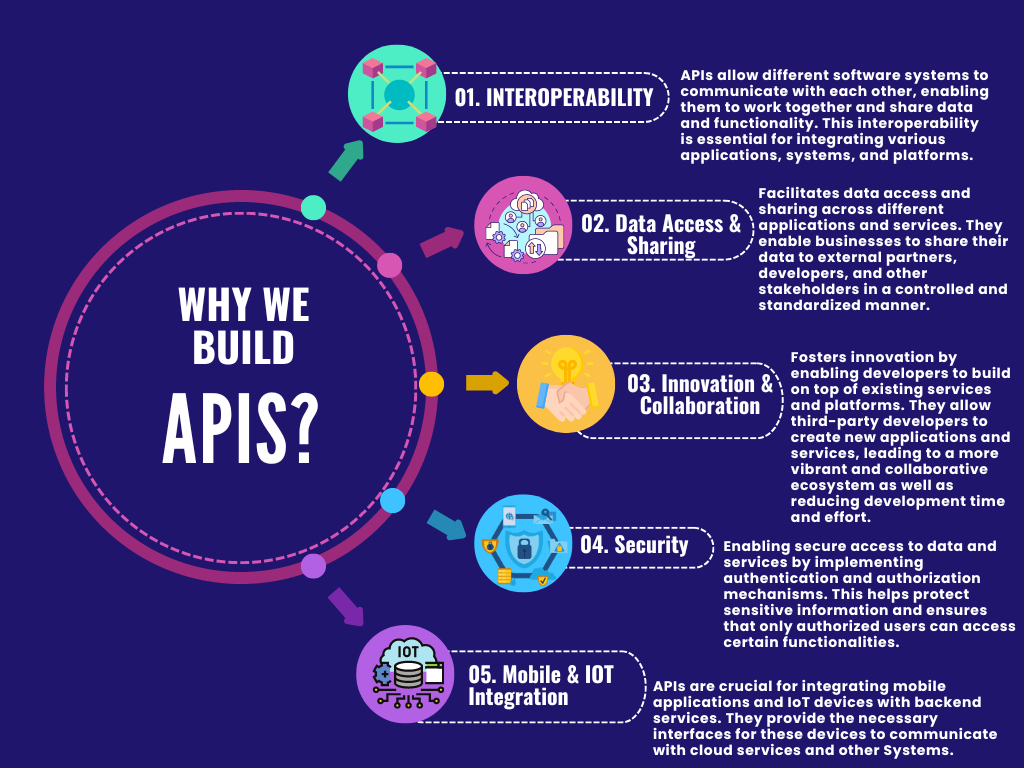APIs are foundational to modern software development, enabling connectivity, efficiency, and innovation across the digital landscape.
APIs (Application Programming Interfaces) are built for several important reasons:
Interoperability: APIs allow different software systems to communicate with each other, enabling them to work together and share data and functionality. This interoperability is essential for integrating various applications, systems, and platforms.
Modularity and Reusability: APIs promote modularity by allowing developers to build modular components that can be reused across different applications. This leads to more efficient and maintainable code.
Abstraction: APIs provide an abstraction layer that hides the complexity of underlying implementations. This allows developers to use the functionality without needing to understand the internal workings.
Scalability: By separating the front-end and back-end functionalities, APIs make it easier to scale applications. Services can be independently scaled based on demand.
Security: APIs enable secure access to data and services by implementing authentication and authorization mechanisms. This helps protect sensitive information and ensures that only authorized users can access certain functionalities.
Innovation and Collaboration: APIs foster innovation by enabling developers to build on top of existing services and platforms. They allow third-party developers to create new applications and services, leading to a more vibrant and collaborative ecosystem.
Efficiency: APIs streamline development processes by providing ready-made building blocks. Developers can leverage existing APIs to implement functionality quickly, reducing development time and effort.
Mobile and IoT Integration: APIs are crucial for integrating mobile applications and IoT devices with backend services. They provide the necessary interfaces for these devices to communicate with cloud services and other systems.
Data Access and Sharing: APIs facilitate data access and sharing across different applications and services. They enable businesses to share their data to external partners, developers, and other stakeholders in a controlled and standardized manner.
Customization and Personalization: APIs allow for customization and personalization of services. Developers can tailor applications to specific needs by integrating with various APIs to provide personalized experiences for users.





Hey people!!!!!
Good mood and good luck to everyone!!!!!
Thanks for sharing. I read many of your blog posts, cool, your blog is very good.
Can you be more specific about the content of your article? After reading it, I still have some doubts. Hope you can help me. https://accounts.binance.com/ar-BH/register?ref=V2H9AFPY
Your point of view caught my eye and was very interesting. Thanks. I have a question for you.
I don’t think the title of your article matches the content lol. Just kidding, mainly because I had some doubts after reading the article.
Your article helped me a lot, is there any more related content? Thanks!
Thank you for your sharing. I am worried that I lack creative ideas. It is your article that makes me full of hope. Thank you. But, I have a question, can you help me?
Your article helped me a lot, is there any more related content? Thanks!
cost cheap clomid without rx can i order generic clomiphene without rx cost of cheap clomid without a prescription name brand for clomid cost of generic clomid pills where to buy cheap clomid no prescription cheap clomid without insurance
More posts like this would add up to the online play more useful.
With thanks. Loads of erudition!
buy azithromycin no prescription – order floxin 400mg sale order flagyl pills
order semaglutide 14 mg pills – semaglutide 14mg for sale cyproheptadine 4mg oral
buy cheap domperidone – buy sumycin 500mg for sale cyclobenzaprine buy online
buy inderal generic – buy plavix without a prescription buy generic methotrexate online
order amoxil generic – order diovan 80mg without prescription ipratropium 100 mcg sale
generic zithromax – order tindamax 300mg pill bystolic 20mg canada
cheap augmentin 625mg – https://atbioinfo.com/ buy generic acillin over the counter
purchase nexium online – https://anexamate.com/ order nexium 40mg for sale
order warfarin 5mg – coumamide losartan 25mg cost
I don’t think the title of your article matches the content lol. Just kidding, mainly because I had some doubts after reading the article.
meloxicam 15mg us – moboxsin.com mobic without prescription
buy generic prednisone for sale – allergic reactions order deltasone 20mg pill
pills erectile dysfunction – site cheap erectile dysfunction pills online
Your article helped me a lot, is there any more related content? Thanks!
amoxil for sale – combamoxi.com cost amoxicillin
order diflucan without prescription – buy generic forcan diflucan 100mg cost
cenforce 100mg pill – https://cenforcers.com/# buy cenforce 50mg generic
buy cialis online overnight shipping – https://ciltadgn.com/# how long for cialis to take effect
buy cheap generic ranitidine – aranitidine cheap ranitidine 300mg
how to get cialis prescription online – click cialis and grapefruit enhance
This is the kind of scribble literary works I positively appreciate. finasteride propecia efectos secundarios
viagra ice cream to go on sale at selfridges – viagra sale cheap buy viagra delhi
I couldn’t turn down commenting. Well written! https://ursxdol.com/get-metformin-pills/
More articles like this would make the blogosphere richer. https://buyfastonl.com/isotretinoin.html
Thanks recompense sharing. It’s top quality. https://prohnrg.com/
With thanks. Loads of expertise! on this site
The thoroughness in this break down is noteworthy. https://ondactone.com/spironolactone/
This is the amicable of topic I have reading.
https://proisotrepl.com/product/tetracycline/
More peace pieces like this would urge the интернет better. https://lzdsxxb.com/home.php?mod=space&uid=5057521
brand forxiga 10 mg – https://janozin.com/ buy forxiga pills
Can you be more specific about the content of your article? After reading it, I still have some doubts. Hope you can help me.
buy generic orlistat online – https://asacostat.com/ orlistat 60mg generic
Greetings! Very useful advice within this article! It’s the little changes which wish espy the largest changes. Thanks a quantity towards sharing! http://iawbs.com/home.php?mod=space&uid=916817
I don’t think the title of your article matches the content lol. Just kidding, mainly because I had some doubts after reading the article.
Can you be more specific about the content of your article? After reading it, I still have some doubts. Hope you can help me. binance tavsiye
Your article helped me a lot, is there any more related content? Thanks!
Thank you for your sharing. I am worried that I lack creative ideas. It is your article that makes me full of hope. Thank you. But, I have a question, can you help me?
You can conserve yourself and your family by way of being alert when buying prescription online. Some pharmaceutics websites operate legally and provide convenience, solitariness, cost savings and safeguards over the extent of purchasing medicines. buy in TerbinaPharmacy https://terbinafines.com/product/doxazosin.html doxazosin
This is the kind of post I turn up helpful. cialis sans ordonnance pas cher
Can you be more specific about the content of your article? After reading it, I still have some doubts. Hope you can help me.
Can you be more specific about the content of your article? After reading it, I still have some doubts. Hope you can help me.
Greetings! Jolly serviceable recommendation within this article! It’s the little changes which will obtain the largest changes. Thanks a quantity quest of sharing!
I don’t think the title of your article matches the content lol. Just kidding, mainly because I had some doubts after reading the article.
I think this website has got very great composed content material blog posts.
Thank you for sharing with us, I believe this website truly stands out : D.
Been playing on 80win8 for a bit now. Gotta say, the payouts have been pretty consistent. Definitely one to watch.
Yo! So I signed up for 6gbetvip recently. The VIP perks are kinda cool, higher limits and stuff. If you’re a high roller, it might be up your alley. Check it out for yourselves 6gbetvip.
Pretty! This was a really wonderful post. Thank you for your provided information.
Enjoyed reading this, very good stuff, thankyou. “It requires more courage to suffer than to die.” by Napoleon Bonaparte.
Howdy, i read your blog occasionally and i own a similar one and i was just curious if you get a lot of spam comments? If so how do you protect against it, any plugin or anything you can recommend? I get so much lately it’s driving me mad so any assistance is very much appreciated.
I conceive this site has got very superb indited written content articles.
Your point of view caught my eye and was very interesting. Thanks. I have a question for you. https://accounts.binance.info/es-MX/register-person?ref=GJY4VW8W
Looking for a Casino Plus voucher? Yeah, me too! casinoplusvoucher seems to have some info. Worth a look if you’re trying to score some extra credit: casinoplusvoucher
You should take part in a contest for one of the best blogs on the web. I will recommend this site!
Alright, spill the beans! Is this aviatorpredictor1win any good? Seems a little too good to be true, you know? Anyone actually scoring wins with this thing? I’m skeptical but curious! See what it’s about here: aviatorpredictor1win
Your article helped me a lot, is there any more related content? Thanks!
Hi there, You’ve performed a great job. I’ll certainly digg it and individually suggest to my friends. I am confident they’ll be benefited from this site.
I reckon something genuinely special in this website.
Thank you for all of your efforts on this web page. My mom delights in getting into investigations and it is easy to see why. We all hear all about the dynamic ways you provide advantageous things via this web blog and as well as welcome participation from the others about this issue plus our own simple princess is without question learning a whole lot. Take pleasure in the rest of the new year. You are conducting a terrific job.
Your point of view caught my eye and was very interesting. Thanks. I have a question for you.
Good V I should certainly pronounce, impressed with your site. I had no trouble navigating through all the tabs as well as related information ended up being truly easy to do to access. I recently found what I hoped for before you know it at all. Quite unusual. Is likely to appreciate it for those who add forums or anything, web site theme . a tones way for your customer to communicate. Nice task..
best casino in the us
top casino sites casinos
best casinos in usa
betmgm Maine betmgm-play betmgm MS
Can you be more specific about the content of your article? After reading it, I still have some doubts. Hope you can help me.
Feel the pulse of real-time betting and strategic gameplay. crown coin casino login offers a wide range of poker variants and roulette wheels. Join now for a thrilling ride!
Sweet Bonanza tempts you with juicy fruits, heart candies, and bomb multipliers ready to explode your balance. One sweet bonanza xmas demo lucky spin can change everything. Dive into the sweetness!
Thank you for your sharing. I am worried that I lack creative ideas. It is your article that makes me full of hope. Thank you. But, I have a question, can you help me?
Stampede toward glory with every thrilling spin. play buffalo slots online delivers sunset scatters, unlimited free games, and gold collection jackpots for endless rewards. Play today!
Thank you for your sharing. I am worried that I lack creative ideas. It is your article that makes me full of hope. Thank you. But, I have a question, can you help me?
Thanks for sharing. I read many of your blog posts, cool, your blog is very good.
chumba casino games: where every spin could mean real money in your pocket. Grab free Sweeps Coins on signup and enjoy top-quality slots. Join the winners!
No cap on withdrawals. No games rigged against you. Just best slots on stake being Stake.
DraftKings online casino Casino: Play bold, win big. Claim 500 Cash Eruption spins after $5 + up to $1K first-day protection. The best is here!